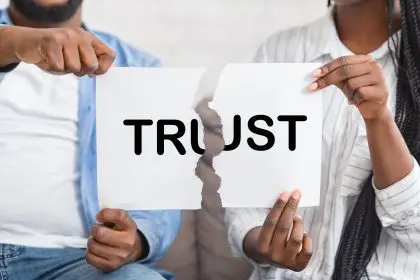Jealousy feels like protection, but it’s actually poison. While you think you’re guarding your relationship by questioning every text message and analyzing every interaction your partner has with other people, you’re actually creating the exact problems you’re trying to prevent. Insecurity has a sneaky way of becoming a self-fulfilling prophecy that can turn even the strongest relationships toxic.
The truth about jealousy and insecurity is that they’re rarely about your partner’s behavior and almost always about your own internal struggles with self-worth, past experiences, and fear of abandonment. Understanding how these feelings operate can help you stop them from destroying something beautiful before it’s too late.
It creates a surveillance state instead of intimacy
When jealousy takes over, you stop being a loving partner and start becoming a detective. You’re checking their phone, monitoring their social media activity, asking detailed questions about their whereabouts, and basically treating your relationship like a crime scene where you’re always looking for evidence of wrongdoing.
This constant monitoring creates an atmosphere of suspicion and distrust that makes genuine intimacy impossible. Your partner starts feeling like they’re being interrogated rather than loved, and they begin to withdraw or become defensive, which only feeds your insecurity more.
The irony is that this behavior often pushes partners away, creating the very distance and disconnection that jealous people fear most. Instead of creating safety, jealousy creates a prison where both people feel trapped and miserable.
Your insecurity becomes their emotional burden
When you’re constantly seeking reassurance about your relationship, your partner becomes responsible for managing your emotions rather than being able to just enjoy being with you. They start walking on eggshells, avoiding certain topics or activities, and spending more energy trying to make you feel secure than building genuine connection.
This dynamic is exhausting for both people. Your partner may start to feel resentful about having to constantly prove their love and loyalty, while you never actually feel reassured no matter how much reassurance you receive. The problem is that insecurity can’t be fixed by external validation, it has to be addressed from within.
You stop seeing your partner as a whole person
Jealousy makes you hyper-focused on your partner’s interactions with others while losing sight of who they actually are as an individual. You start viewing them solely through the lens of potential threats to your relationship rather than appreciating their personality, interests, and the reasons you fell for them in the first place.
This narrow focus prevents you from actually enjoying your relationship or supporting your partner’s growth and friendships. You become so consumed with protecting what you have that you forget to nurture and appreciate it.
It prevents honest communication
Insecurity makes every conversation feel loaded with hidden meanings and potential threats. Instead of having open, honest discussions about your needs and concerns, you end up having coded conversations where you’re fishing for information or trying to catch your partner in inconsistencies.
This communication style makes it impossible to address real relationship issues or build deeper understanding. Your partner may start avoiding certain topics entirely to prevent triggering your jealousy, which creates more distance and secrecy in the relationship.
You miss out on genuine trust and security
The biggest tragedy of jealousy is that it prevents you from experiencing the real security that comes from genuine trust and mutual respect. When you’re constantly worried about threats to your relationship, you can’t relax into the joy and comfort that healthy partnerships provide.
Breaking the jealousy cycle
Managing jealousy and insecurity starts with recognizing that these feelings are information about your internal state, not facts about your relationship. When jealousy arises, instead of acting on it immediately, try to identify what’s really triggering the feeling.
Are you feeling insecure about your own worth? Are past experiences making you expect betrayal? Are you projecting your own fears onto innocent situations? Understanding the root cause helps you address the real problem instead of trying to control your partner’s behavior.
Building genuine security
Real relationship security comes from knowing that you’re valuable and lovable regardless of what happens in any particular relationship. This means working on your own self-worth, maintaining your individual identity and interests, and building a life that feels fulfilling with or without a partner.
When you feel secure in yourself, you can love your partner freely without needing them to constantly prove their loyalty. You can trust them because you trust yourself to handle whatever happens. That’s when relationships become truly beautiful and sustainable.
Jealousy might feel like love, but real love feels like freedom.
















